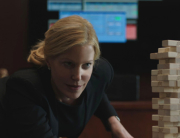Marjorie Prime is an absorbing family drama of grown-ups facing their pasts and present, with a thoughtful near-future twist. If people are composed of memories, who are they when their memories are reconstructed in a life-like artificial intelligence (AI)?
Director Michael Almereyda visually hones his adaptation of Jordan Harrison’s play by setting the family in a timeless beach house, with the addition of a flashback for each character. Octogenarian Lois Smith reprises her stage role as Marjorie, an 86-year-old mother slowly sinking into dementia. Marjorie is just getting used to her younger male companion. When she corrects his comments, he graciously notes, “Great. I’ll remember that now.” It’s only when she steps through his body that we realize he is only a hologram of her late husband, Walter, and his memory is stored on a computer chip. Marjorie selected Walter to appear as he did more than 30 years ago—when he looked like Jon Hamm.
Her daughter, Tess (Geena Davis), finds this young “Daddy” very disconcerting, just like children who resent their parents for having a full life before the family expanded. Marjorie’s son-in-law, Jon (Tim Robbins), is busy reading the AI’s instructions and adding Marjorie’s recollections to the selectable options. Walter AI comes programmed with conversational gambits, like, “Do you remember when I proposed?” But as Marjorie warmly describes the circumstances, a brief flashback (with Hannah Gross as a younger Marjorie) reveals that she was considerably younger than Walter and their relationship was more sensual and unconventional than she can convey to Tess and Jon. But this Walter AI will never share that fulsome memory.
Each time we see Marjorie with Walter AI, she has lost some more communication capacity about her past. As a former violinist (like the playwright’s mother), she asks him if she can still play the violin. More compassionate than C3PO, his response is to fill the house with the sound of music (he’s like an iPod). The score by Mica Levi (of Micachu and the Shapes) uses synths to effectively re-create the sense of violin memories instead of just duplicating familiar tracks. Marjorie struggles to describe one her favorite days, a winter afternoon spent in a Central Park full of “orange flags.” While Tess shrugs unknowingly at this anecdote and Jon inserts the phrase into the AI’s memory bank, viewers see a montage of Christo and Jeanne-Claude’s art installation The Gates (footage courtesy of the late Albert Maysles’s 2007 documentary also titled The Gates).
Haunted by memories of her father’s funeral (bolstered by flashbacks), Tess becomes more and more frustrated with this emphasis on programming her “father” and the reinforcement of only her mother’s happy memories. (The AI plot device is like a technological version of Brave New World’s hallucinogenic drugs, somas.) Tess is also angry that her parents never dealt with the major tragedy looming over her life, the death of her beloved brother, Damian, and now she still can’t talk about him because of her mother’s selective memory. Cinematographer Sean Williams’s misty images of precipitation suggest seasonal changes to mark nature’s time passing, reinforced by Richard Reed Parry (of Arcade Fire) and Bryce Dessner’s (of the National) ”Wave Movements” symphony.
More intellectual than emotional, this movie is perfect for open-ended post-screening discussions: Is Tess’s issue with the technology or how it’s programmed? Are you ready to put in an order for your AI companion of a lost loved on? What memories would you program?

















Leave A Comment